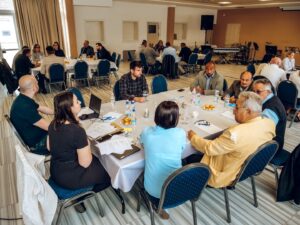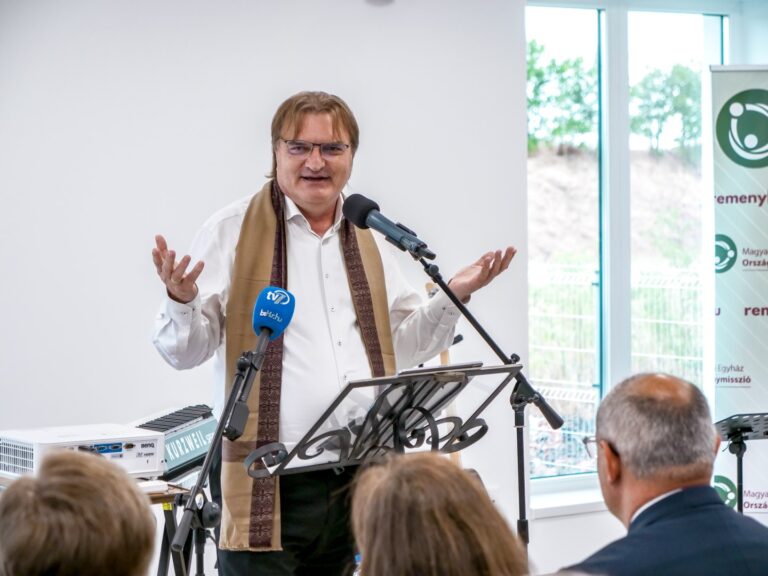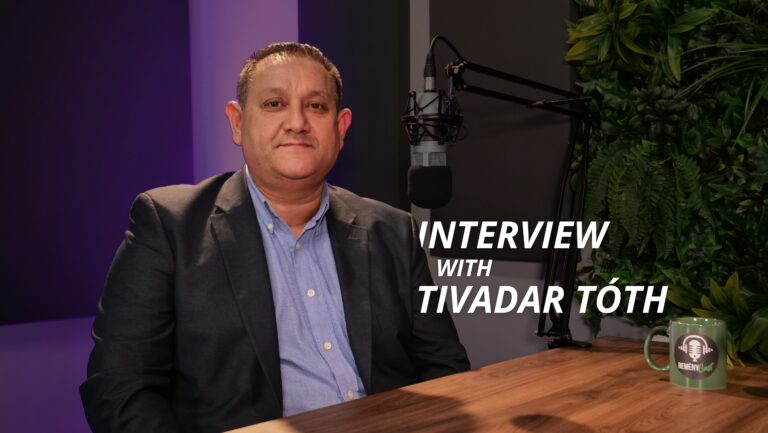Géza Ásós, the owner of the first Hungarian Roma restaurant, started from humble beginnings in the Roma settlement of Békés and has now built an exemplary business. We will talk with him about the coexistence of Roma and Hungarian communities, the importance of preserving Roma culture, and, of course, delicious dishes. Let’s explore Géza’s life journey, his struggles, and his successes, which offer valuable lessons for us all.
I noticed that while browsing the comments on your YouTube channel, I didn’t come across a single negative comment. What’s your take on that? It’s quite an achievement.
I’m very happy to hear that. I read every comment, though many people say I shouldn’t. I believe when you present yourself honestly and authentically, without pretending to be someone else, people appreciate it more. If you stay genuine, it shows in the feedback. In my case, people saw that I was being my true self, and that’s why the responses have been positive. My background plays a role too; I come from a simple Roma family, and the example of my hard-working parents is an important part of who I am.
You’ve always lived in Békés, correct?
Yes, I was born and still live in Békés. My mother worked in floriculture, and my father in urban management. In 2022, both my father and I became entrepreneurs—he at 43, and I at 21. My father’s expertise and work ethic made him a respected entrepreneur, and today, we are among the largest Roma employers in the city and county.
Did your work ethic come from home?
Absolutely. From a young age, we were taught that you only own what you’ve worked for, and a useful person is someone who completes the tasks assigned to them. In our family, manual labor was fundamental, with the highest level of education being that of a laborer or a shoveler. However, my parents were strict about education, always ensuring we did our homework. Thanks to their insistence, everyone in our family has now graduated from high school, and some even have technical qualifications. My children and grandchildren are attending college, which is a huge leap for our generation.
Did you enjoy studying, or did you always want to work in hospitality?
I actually enjoyed studying, as well as playing sports. As a young man, I had big dreams of becoming an NB I footballer and playing on the national team. I made it to NB III, but by 18, I had to decide between pursuing football with little financial security or starting to work. I was already in a serious relationship by then and got married soon after, so I chose work. I had been working summers alongside my father since I was 13 or 14, so the transition felt natural.
Did you face discrimination because of your Roma background as a child?
As a child, I didn’t feel discriminated against. I did learn that as a Roma, you often need to work harder and prove yourself more, but my parents always taught me not to complain. They reminded me to behave properly and never give anyone a reason to criticize us. They instilled in me the belief that hard work and discipline are key. Of course, there were moments where people could have made negative remarks, but I never took them to heart. I teach my children and lead my employees with this same mentality—maintaining cleanliness, discipline, and attention to detail is paramount.
With 29,000 followers on Facebook and appearances on numerous TV shows, I’m particularly careful not to give anyone a reason to misjudge or misunderstand me. Media appearances have become routine, and I don’t get nervous. Years ago, I was invited to be part of a reality show but declined because I didn’t want to portray a version of myself that wasn’t real.
You didn’t want to participate in a reality show?
No, it never appealed to me. I have principles, and I couldn’t be myself in a pre-scripted situation. I’m not an actor, and I don’t like it when people pretend to be someone they’re not. Staying true to myself is important.
Do you think there’s still a need for top-down support in Roma integration, or what do you see as the main issue for the Roma community?
In Békés, the integration of Roma has been remarkable over the past 25–30 years, even on a European level. It’s not just a local phenomenon. The first Roma restaurant, the Hungarian Gypsy Missions International headquarters, and many successful Roma entrepreneurs are all based here. The Roma who want to advance are doing so. The problem is with those who wait for support without taking any initiative for their own progress. Support is important, but real success requires dedication, persistence, and personal effort.
Do you see yourself as a strict boss?
Not strict, just consistent. I only ask from my employees what I’m willing to do myself. In my new business, for example, I do whatever task is necessary, whether it’s washing dishes or delivering pizzas. One of my employees even remarked that they had never seen a boss deliver pizzas before. But as the owner, I’m invested in the business running smoothly, so I take part in every process.
Can you tell us about your relationship with your wife and how she supports you?
We met in January 1997; we’re both from Békés. My work has always been intense, especially during festival seasons when I would be away, working late into the night. It’s not an easy lifestyle, but my wife has been a huge support, taking care of the home and children. Without her, I wouldn’t have been as successful. Even after 27 years, I’m still deeply grateful to her. She’s responsible for 85–90 percent of our marriage’s success.
So you share a strong bond?
Definitely. Even today, we make many important decisions together. I often seek her advice, as she has a strong intuition, especially when it comes to people or business opportunities. I value her opinion, and we work as a team.
Starting your business was a big risk, right?
Yes, it was a huge risk. My entire career in hospitality began with a food truck called Kira Buffet. Later, we took over a pub and tried to turn it into a restaurant. Sticking to my principles—like banning smoking, even before it was law—led to losing many customers. But in the long run, I believe it was the right choice. I have always trusted that staying true to my principles would pay off, and it has.
You’ve spoken in Brussels and received the Pro Cultura Award. How did you feel during those moments?
To be honest, I didn’t feel much. I was more focused on returning to a group I was working with. I gave my speech from memory and felt a bit bored by the end of the event. However, I was glad to speak my mind and present the real situation for Roma entrepreneurs. A Montenegrin gentleman even commented that I came across more as a politician than a businessman.
Have you ever considered entering politics?
I’ve had several offers, but politics isn’t for me. I’m too honest to navigate that world. I wouldn’t want to involve my family in political disputes either. I believe we’ve done more for Roma-Hungarian coexistence through my restaurant than most politicians have. The most important thing is that people, no matter their background, can sit at the same table and treat each other with respect.
You established an award at the Reményhír institution. Can you tell us about that and your relationship with HGMI?
The “For Your Future” award helps socially disadvantaged but well-performing students. It provides them with the tools they need for further studies. My relationship with the Hungarian Gypsy Missions International is also significant; they’ve supported me over the years, and I’m grateful for the partnership. Albert Durkó and the other leaders see me as a partner, and for that, I am very grateful. I sincerely hope that the mission continues to operate successfully and provides opportunities for as many children as possible.
Where do you see yourself in five years?
I hope to have more grandchildren and continue the success of my business. I never imagined that my dream of working in hospitality would turn out so well. I’d love to create Hungary’s first Roma street food restaurant. God’s ways are mysterious, but I look forward to facing whatever challenges come my way.

















